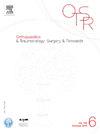Does the use of topical vancomycin during primary hip or knee arthroplasty protect from infections?
IF 2.2
3区 医学
Q2 ORTHOPEDICS
引用次数: 0
Abstract
Background
Infection is one of the main complications of hip and knee arthroplasties. Topical application vancomycin to prevent postoperative infections is efficient in spine surgery, and is spreading in prosthetic surgery. However, its clinical relevance and safety are still under debate. Thus, we conducted the present study to (1) assess whether topical vancomycin reduces peri-prosthetic infection rate, and (2) investigate its influence on surgical wound complications.
Hypothesis
Our hypothesis was that topical administration of diluted vancomycin during arthroplasty would reduce infection rate within the first postoperative year.
Material and methods
In total, 1900 hip and knee arthroplasties were performed between 2014 and 2021 in a single hospital. From July 2018 and December 2021, 910 prostheses were implanted with intra-articular instillation of vancomycin and tranexamic acid. From November 2014 to June 2018, 990 prostheses were set up without vancomycin. During a follow-up of minimum 12 months, we reported periprosthetic infections occurring during the first postoperative year, as well as vancomycin-induced general or cutaneous complications.
Results
We observed periprosthetic infections in 9/990 cases (0.91%) of the control group and 10/910 cases (1.1%) of the vancomycin group (p = 0.82). In parallel, we observed wound complications (erythema, seroma, hematoma, dehiscence and delay in wound healing) in 19/990 (1.9%) and 10/910 cases (1.1%) of the control and vancomycin group, respectively (p = 0.19). There were no general complications resulting from the application of vancomycin.
Discussion
Topical diluted vancomycin does not reduce periprosthetic infection risk, and has no effect on the occurrence of surgery wound complications. Considering the present findings, the use of vancomycin cannot be recommended in current practice to prevent infections following hip and knee arthroplasties. Finally, its use does not induce any specific complications, whether local (cicatrisation) or general (related to ototoxicity or nephrotoxicity).
Level of evidence
III; case control study.
在初次髋关节或膝关节置换术中局部使用万古霉素能否防止感染?
背景:感染是髋关节和膝关节置换术的主要并发症之一。在脊柱手术中,局部应用万古霉素预防术后感染是有效的,并且正在假体手术中推广。然而,其临床相关性和安全性仍存在争议。因此,我们进行了本研究,目的是:(1)评估局部万古霉素是否能降低假体周围感染率;(2)研究其对手术伤口并发症的影响:我们的假设是,在关节置换术期间局部使用稀释的万古霉素可降低术后第一年内的感染率:2014年至2021年间,一家医院共进行了1900例髋关节和膝关节置换术。从 2018 年 7 月至 2021 年 12 月,910 例假体植入时关节内灌注了万古霉素和氨甲环酸。从 2014 年 11 月至 2018 年 6 月,990 个假体在植入时未使用万古霉素。在至少12个月的随访期间,我们报告了术后第一年内发生的假体周围感染,以及万古霉素引起的全身或皮肤并发症:对照组有 9/990 例(0.91%)发生假体周围感染,万古霉素组有 10/910 例(1.1%)发生假体周围感染(P = 0.82)。与此同时,我们还观察到对照组和万古霉素组分别有 19/990 例(1.9%)和 10/910 例(1.1%)患者出现伤口并发症(红斑、血清肿、血肿、裂开和伤口愈合延迟)(p = 0.19)。使用万古霉素后未出现一般并发症:讨论:局部稀释万古霉素并不能降低假体周围感染的风险,对手术伤口并发症的发生也没有影响。考虑到目前的研究结果,目前还不能推荐使用万古霉素来预防髋关节和膝关节置换术后感染。最后,使用万古霉素不会引起任何特殊的并发症,无论是局部并发症(糜烂)还是全身并发症(与耳毒性或肾毒性有关):证据等级:III;病例对照研究。
本文章由计算机程序翻译,如有差异,请以英文原文为准。
求助全文
约1分钟内获得全文
求助全文
来源期刊
CiteScore
5.10
自引率
26.10%
发文量
329
审稿时长
12.5 weeks
期刊介绍:
Orthopaedics & Traumatology: Surgery & Research (OTSR) publishes original scientific work in English related to all domains of orthopaedics. Original articles, Reviews, Technical notes and Concise follow-up of a former OTSR study are published in English in electronic form only and indexed in the main international databases.

 求助内容:
求助内容: 应助结果提醒方式:
应助结果提醒方式:


